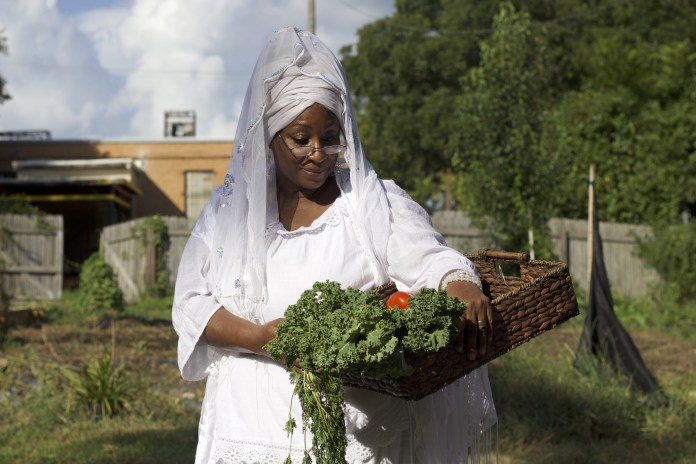A little over a year ago Abrianni Perry, a 28-year-old transplant from Houston, came to Cooperation Jackson to learn about cooperatives from people who’ve been doing it for decades. She’s been happily plunging her hands into the rich West Jackson, Mississippi ever since.
“It’s a beautiful thing to be able to feed your community, especially in a food desert,” she says as she works the seven acres of the Fannie Lou Hamer Community Land Trust’s Freedom Farm in anticipation of the fall growing season. “The dirt is soft, and when it’s wet I feel like a little kid making mud pies. When a nice breeze comes by, and a cloud provides shade, it’s like God kissed you on the forehead.”
Like the land trust itself, the farm is named for Hamer, a 20th century community organizer, civil rights leader and icon of resistance. Among other major initiatives, Hamer organized Mississippi Delta sharecroppers, and created the Freedom Farm Cooperative in 1969.
This summer Freedom Farm yielded two tons of melons and veggies, about double last year’s total — which was harmed by a particularly hot growing season. “This year we adjusted by putting shading over the plants,” Perry explained. “But if climate change continues, how will we have food from the gardens? Everything is burning up.”

Image Credit: Jason Kerzinski
The program is one of many run by Cooperation Jackson (CJ), a cooperative federation and solidarity economy catalyzer co-founded in Jackson in 2014 by Kali Akuno and Sacajawea Hall. Funded through coop member dues, grants, major donors and money earned from selling the harvest at a fair price.

Image Credit: Jason Kerzinski
CJ’s food sovereignty program hopes to produce sufficient food to feed 25,000 mostly working class African-Americans. Along with the main farming operation, a coop grocery store, café, food truck and joint aquaponics and hydroponics installation are in the works.
Fighting food deserts
According to the Mississippi Food Network the state leads the nation in hunger, and the county where Cooperation Jackson is located is an epicenter with “more hungry people in Hinds County (61,720) alone than in the entire state of North Dakota (55,710)”; and food deserts, mapped by the University of Mississippi Medical Center, are prevalent in both rural areas and urban centers like West Jackson. Urban food deserts are defined as areas where citizens must traverse more than a mile to reach a grocery store, where low income limits their purchasing power, and where residents lack adequate transportation to get to their nearest store. According to Kali Akuno, CJ’s co-founder, the number of grocery stores operational in Jackson has dropped to 15 total and none are within walking distance of West Jackson where many people have no vehicles or Internet access and limited and spotty access to public transportation.
“In this neighborhood, the convenience store at the former gas station is the main source of food, and before that it was the Dollar General,” says Akuno. The food they found there was boxed and processed, rich in salt and low in nutrients, he continues, calling an environment where canned corn priced cheaper than a fresh stalk and calling it “a straight-up type of warfare in our communities.”
In a normal year, the vast majority of Freedom Farm’s organically grown, pesticide-free produce is sold at two farmers markets in Jackson. But because of COVID-19, this year much of it was given away to support mutual aid efforts. “There is a great need,” says Akuno.
But in the normal course, coop members and residents of their immediate community can buy food at CJ’s headquarters at the Kuwasi Balagoon Center when sales are announced or when CJ sets up tables outside during harvest season and people stop by. CJ is in the process of developing a delivery operation to spread their reach.
“We know our people will eat greens three or four times a week,” Akuno says. “It’s a cultural staple, if it’s affordable.”
Freedom Farm hopes to open The People’s Grocery Store by year’s end. Named in honor of a grocery store that was opened in Memphis in 1889. That store’s African-American proprietor, Thomas Moss, was lynched in 1892.
CJ has accelerated their planned opening amid the pandemic. “One of the lessons we learned from [Hurricane] Katrina is that we cannot rely on the government to come to our aid,” Akuno says. “The state really is an instrument of class rule and doesn’t have any interest in protecting working class people in the long haul.”
The Fannie Lou Hamer Community Land Trust holds the future grocery coop building in trust and charges no rent. Much of the inventory of fresh produce will be provided by Freedom Farm, with the rest coming from other local African-American growers. The significant cost savings from not having to pay rent or buy most inventory allow The People’s Grocery to keep prices low.
A café planned for the premises will eventually serve as home base for a retrofitted food truck designed by Nandini Bagchee, an architecture professor at City College of New York. The People’s Grocery will also produce its own food, with fish and vegetables grown in a vertical aquaponics and hydroponics system. Waste from the fish will help fertilize the plants.

Image Credit: Jason Kerzinski
“We couldn’t have done this six months ago,” Akuno says, referring to the 3-D printing operation that is producing the key components for the hydroponics operation. That leap in technological acumen came as CJ’s Community Production Center labored to meet the emergency need for masks at the outset of the pandemic. “From doing the PPE mask production, they’ve mastered the skills with the plastics and the molding,” Akuno adds.
On three separate visits between 2016 and 2018, Akuno and other CJ leaders studied indoor food growing systems at the Green Fab Lab in Barcelona. They learned about a process called moss voltaics which fuels plant-reading censors that detect how much heat, light and water certain plants need.
“It runs primarily off the energy generated by the moss that you’re growing on the aquaponics/hydroponics thing,” Akuno says in a rush of geeky delight. “You don’t have to have extra batteries, the plants themselves provide the energy.”
Spreading the wealth
The COVID-19 pandemic has added to West Jackson’s existing food insecurity problems — so CJ has continued to expand operations. “This is just the first wave,” Akuno says. “COVID-19 will become a common occurrence over time like its cousin the flu. But, it’s likely to remain far more deadly for years to come.”
He also worries that the continued degradation of public health systems, ecological damage and authoritarian drift of government leave society ill-prepared to handle future health crises. In the meantime, the price of essential goods continues to rise with the USDA noting the consumer price index for food has risen 4.1 percent since July 2019.
So CJ is encouraging community members to bolster their own food security with small backyard gardens, growing in coordination with neighbors. Residents can learn to farm by volunteering in Freedom Farm’s permaculture or conventional gardens, attending classes or scheduling an at-home consultation with the Freedom Farm workers, also known as “anchors.”
“We are two generations away from growing food in our backyards and out of pots,” says Sister Imani Olugbala Aziz, Freedom Farm anchor and program coordinator. “We used to do that, our grandparents did that, but the art of growing food is nearly lost upon these generations. So we’re trying to reintroduce it to show young people what is food and what is not, what can be used for medicine, and not. It does something to your spirit, to be out there in the sun and attaching yourself to the energies of the soil.”

Image Credit: Jason Kerzinski
It’s clear the project is gaining momentum. CJ is growing large quantities of kale on another Freedom Farm site outside the city limits. The harvested kale will be processed into kale chips at the CPC, and distributed in partnership with Community Movement Builders out of Atlanta, a sister organization.
“2021, it’s going to be out there,” Akuno says.
Another five acres there will be devoted to an experiment in industrial hemp cultivation, now permissible under state law with appropriate licensing. “For us, it means we can grow the materials that we need for the long-term sustainable housing — hemp and bamboo,” Akuno says.
In the meantime, back at Freedom Farm central, Perry reports they’re building a water cachement system that will hold a 100-gallon water tank for irrigation and, if necessary, drinking water. She recalls a recent visit to the garden with her nephew.
“He’d come into the garden and help me pull weeds,” she says. “Seeing that made me really happy, the next generation. He’d say, ‘I’m going there to eat!’ And my niece who lives in Houston is taking up farming, too.”
From TNI:
Two disclaimers we suggest including with the story when you send it in a pitch.
“The Transformative Cities Initiative, hosted by the Transnational Institute, provided research and reporting support for this article.”
And “Cooperation Jackson is one of twelve inspiring stories of local transformation shortlisted for the 2020 Transformative Cities People’s Choice Award. Transformative Cities is a global process to search and support transformative practices and responses that are tackling global crises at the local level. You can still vote for the initiative that you find deserves more attention and resources to scale up until the 16th of November at: https://transformativecities.org.”
Related posts:
Views: 0
 RSS Feed
RSS Feed

















 October 22nd, 2020
October 22nd, 2020  Awake Goy
Awake Goy 

 Posted in
Posted in  Tags:
Tags: 
















